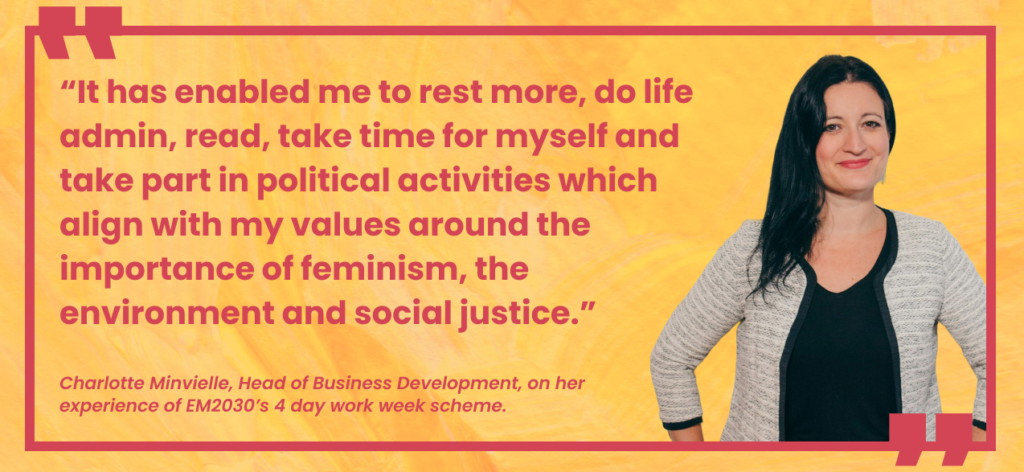The future of work is here, and it’s a 4-day week
Written by Charlotte Minvielle, Head of Business Development
The Equal Measures 2030 Secretariat is a fully remote and global team with members based in Canda, India, Lebanon, the United Kingdom, Kenya, the United States, South Africa, Senegal, Spain, Cote d’Ivoire, Argentina, and Brazil. A recent survey sent out to our team members, found that 100% of respondents felt satisfied with our 4-day-week policy, with 86% being extremely satisfied.
In a rapidly changing world, the traditional five-day work week is increasingly coming under scrutiny. New studies and pilot programs are heralding the 4-day work week as a game-changer for productivity, employee well-being, and even wider societal health. Equal Measures 2030 has been part of this movement, reaping the benefits of a shorter work week for over a year. In this blog post, we’ll delve into compelling evidence and firsthand accounts that underscore why it’s high time for the 4-day work week to go mainstream.
Enhanced motivation and wellbeing
Since the policy has been put in place, our team has felt more motivated and energised. All respondents said that a 4-day work week had increased their job satisfaction. One of them said: “I feel that this schedule has allowed me to have more quality time with me, my family and friends and engage in self-care activities. I feel more fulfilled in general in both my personal and professional life”.
From what our team is telling us, you work more efficiently to do the best you can during those 4 days. “It boosts morale, and it makes me want to stay longer with the organisation”. This was echoed by the findings of a UK pilot – the biggest in the world – which showed a substantial 57% drop in the likelihood that an employee would quit, dramatically improving job retention.
Taking a cooking class, going for a walk, buying the paper instead of reading it online, volunteering, going to an exercise class or just resting -these are all things Equal Measures 2030 secretariat members have been up to during their free time on Fridays.
All respondents to our survey said that they had seen improvements in their work-life balance. One employee said that the 4-day week had enabled them to “work on personal projects or just take time to read a book or do something [they] like” and another one shared that the scheme “reduced stress levels and improved happiness”.

Increased productivity
The 4-day scheme doesn’t just boost well-being, it can boost productivity and efficiency – a convincing incentive for private sector businesses. When the French IT company, LDLC, instituted a 32-hour week, they saw a 40% increase in profits. Annual turnover increased from €500 million to €700 million whilst employee numbers stayed the same. In fact, absenteeism and workplace accidents fell by 50%.
Our employees found that the condensed week encouraged them to optimise their hours and better organise their tasks. One of them said: “knowing that there is a shorter timeframe to complete tasks helps me concentrate more.”
Wider societal impact
There are also wider social and environment benefits to a 4-day week. If countries decided to put in place a 4-day work week at the national level, it could have a significant impact on our planet. During the Covid-19 pandemic, the decrease in economic activity resulted in a significant reduction in carbon emissions with global daily emissions falling by 17% in 2020, according to a study published in Nature.
For the economist Aurelie Piet, working less means polluting less. This is because it often leads to less travel, use of office lighting, elevators, heating, air conditioning or energy-intensive equipment. A 4-day week could reduce the UK’s carbon footprint by 127 million tonnes per year, which is the equivalent of taking 27 million cars – effectively the entire UK private car fleet- off the road according to The 4 Day Week Campaign research.

Living our feminist values
At Equal Measures 2030, we recognize that our lives don’t revolve solely around what we do professionally; time to ourselves is precious and what we are able to contribute to society outside of work matters too. According to our Executive Director Alison Holder: “I have long been persuaded by the value of the 4-day work week, and considering recent pilot studies, the evidence is clear. I am so glad we were able to put our feminist values into practice at EM2030 by implementing policies like this”
According to Oxfam, women and girls undertake more than three-quarters of unpaid care work in the world. Our predominantly female team has told us how a 4-day work week has helped them better manage and cope with their caring responsibilities. One of them said that it allowed them to “organize personal and household tasks before childcare on the weekends”. Another one shared that: “with a child with special needs, I am able to schedule additional childcare tasks on Fridays”.

As a team of driven and passionate feminists, there’s also often more we want to do to positively contribute to society. One team member has “been volunteering as a youth creator with a young feminist collective in India” on Fridays, whilst another has used the time to “take part in political activities which align with my values around feminism, the environment and social justice”.
Additionally, our employees found that it allowed them to develop new skills that they might not have been able to gain otherwise – “I feel my job is a place that allows me to live other elements of my life more fully. Some of the things we may be doing on Fridays can contribute positively to who we are including as employees and team members”.
Lessons for implementation
It might be of no surprise that 100% of respondents to our survey would recommend a 32-four-day week to other organizations “without a doubt”. Here are some of our reflections and suggestions on how to make the process work for your organization:
- Reduce working hours to 32-hours per week and make sure that what you are offering is not just compressed hours over 4 days. And of course, guarantee that there will be no loss of pay for your staff in the process.
- Choose one day where everyone is off if your type of organization or business allows it. We decided to make Friday the non-working day for everyone. This made most sense for us logistically and we also believed that it reduces the pressure for anyone to be working on that day. As one of our employees put it: “knowing that the whole team is off on Fridays is more relaxing”.
- Take time to communicate this well with your employees. One employee recommends “a lot of communication during the implementation process and clear guidelines to prevent overwork”.
- Be prepared to explain your decision externally. You may be bought into this but fear how other stakeholders will react. As one of our staff members said: “The biggest challenge is aligning with partners and others who still work a 5-day week”. You have to be ready to clearly explain why you think this is the right decision for your organisation from a business and values standpoint.
The fight for a weekend was one of the last century’s great labour victories; the push for a 4-day work week could very well be this century’s. The data is in, and the benefits are clear: from increased productivity and job satisfaction to meaningful contributions to gender equality and environmental sustainability. It’s not just a ‘nice-to-have’; it’s a must-have for any forward-thinking organization.
We at Equal Measures 2030 urge companies and policymakers alike to take this leap forward. If you’re considering this move and need insights, we’re more than willing to share our journey and learnings. The future of work is here, and it’s a 4-day week



